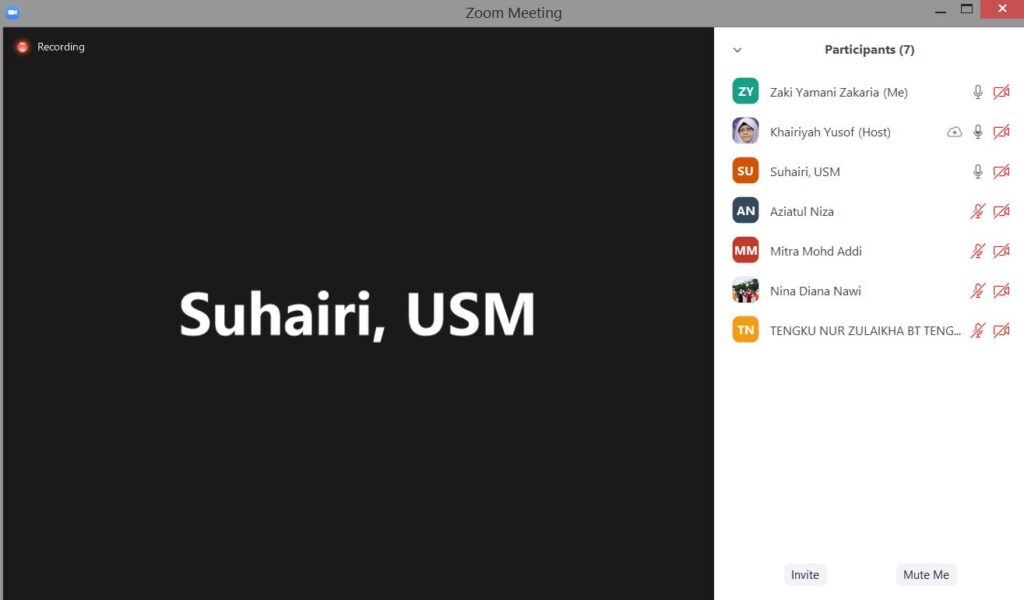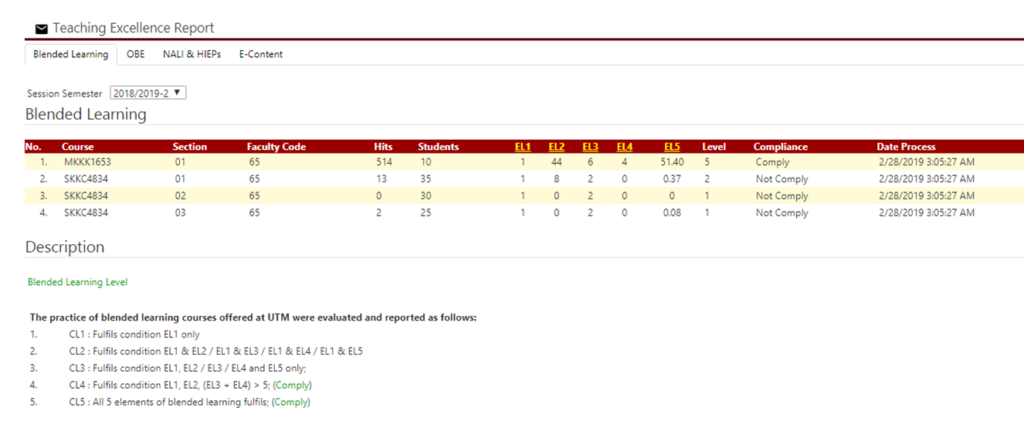
We’ll be handling 2 more workshops in this coming weeks. The workshops are Active Learning Workshop @ 26-28 July for UNS and also Cooperative Learning Workshop @ 3-4 August.
Ir. Ts. Dr. Zaki Yamani Zakaria Official Page
School of Chemical & Energy Engineering, Faculty Engineering, UTM

We’ll be handling 2 more workshops in this coming weeks. The workshops are Active Learning Workshop @ 26-28 July for UNS and also Cooperative Learning Workshop @ 3-4 August.
Early in the morning, this is the one important live webminar that I joined and participated with. Amazing!!!
📚CEE UTM Webinar Series📚 🔎
HOW TO GET ONLINE STUDENTS ACTIVELY ENGAGED
🔎 Extensive research has shown that people learn best by doing things and reflecting on what they have done, not by watching and listening to someone else telling them what they are supposed to know. While a good lecture can motivate and instruct students, if lecturing is the only thing that happens in a class, much less learning takes place than would occur if more active teaching methods were mixed in.
Methods for getting students actively engaged in traditional face-to-face classes have been developed and shown to be effective in hundreds of studies. Getting students actively engaged in online classes poses unique challenges, however, and methods for doing it are in a much lower state of development. This webinar outlines several of them and offers suggestions for making them effective.
Learning Outcomes:
After participating in the webinar, you will be able to answer the following questions:
-What is online active student engagement?
-What forms might it take?
-Which of those forms are most likely to effectively promote students’ learning?
-What specific online engagement strategies have been found effective in synchronous and asynchronous online courses?
-What conditions should be in place in online instruction regardless of which specific engagement strategies are adopted?
Dr. Felder has authored or co-authored over 300 papers on chemical process engineering and engineering education. He has won numerous awards for his teaching, research, and publications.
Dr. Brent is President of Education Designs, Inc., with more than 35 years of experience in education and specializes in staff development in engineering and the sciences, teacher preparation, and evaluation of educational programs at both precollege and college levels.
Read all my “1 Official Task Per Day Record Challenge for 2020” —> https://people.utm.my/zakiyamani/category/1-activity-1-day/
Saya telah dijemput oleh PM Dr. Kamaruddin untuk menjadi salah satu panel dalam sesi diskusi Sembang Santai anjuran UTMFREE SKT. Tajuk perbincangan ini sangat menarik iaitu, “Sukarkah Nak Buat Pembelajaran Aktif Ni?”
Panel-panel terdiri daripada PM Ir Dr Mimi Haryani Hasim, Dr. Muhd Nazrul Hisham Zainal Alam, Dr. Hasrinah Hasbullah dan saya sendiri. Manakala PM Dr. Kamarudin adalah Moderator bagi program ini.
Santai Diskusi ini dijalankan secara FB LIVE dan kami semua berada di rumah masing-masing. Untuk melihat rancangan istimewa ini, sila click link ini.
Read all my “1 Official Task Per Day Record Challenge for 2020” —> https://people.utm.my/zakiyamani/category/1-activity-1-day/
The School of Chemical and Energy Engineering (SKT) Universiti Teknologi Malaysia organized a 2-day Active Learning Workshop from 17-18 February 2020. Almost 40 academic staffs from SKT joined the workshop. The trainer of the workshop were Prof. Dr. Khairiyah Mohd Yusof and Dr. Syed Helmi while I was the facilitator alongside PM Dr. Mimi Haryani Hasim.
Read all my “1 Official Task Per Day Record Challenge for 2020” —> https://people.utm.my/zakiyamani/category/1-activity-1-day/
Today we had this talk at BMU delivered by PM DR. Nazihah, from Curriculum Innovation & Development Unit (CIDU), UTM.
Read all my “1 Official Task Per Day Record Challenge for 2020” —> https://people.utm.my/zakiyamani/category/1-activity-1-day/
1) Infographics of CEE Workshops and Trainings around the globe:
2) News from Worldbank Organisation:
3) Testimonials from participants (in Bahasa Malaysia language):
https://m.facebook.com/story.php?story_fbid=10217326509146333&id=1581231424
4) List of Trainings and Workshops conducted by CEE:
https://www.youtube.com/watch?v=4ziazmwipiY&feature=youtu.be
Today, we conducted Active Learning (AL) for our Master MKKK1653 – Chemical Plant and Safety. There were 10 students altogether and they were divided to 3 groups. We assigned 3 expert teams and they meet up in the expert team meeting (Jigsaw application).
The topic that was used for this AL application is Introduction to Relief.
I am very happy that I reached Level 5 for Blended Learning for my Master MKKK1653 in just Week 5 in this semester.

It’s the first day of the new semester. Welcome back all students 🙂 … and luckily I managed to start the class in between 2 public holidays 🙂 pheeewww…
Studying / learning fact-based subject such as History or Geography seems easy via a traditional class lecture style. However, we are not sure whether the student can capture, comprehend and apply what they just learned. Such traditional lecturer can be a “syok sendiri” situation, which is easy to deliver for the teacher/lecturer. Well, there is no different with this subject called “Refinery and Petrochemical Technology” (SKKC4723) for the final year students, which I am teaching this semester. This subject is full pack with petrochemical glossaries of chemicals, processes, equipment and others.
In order to make the learning experience more interesting and to ensure student can comprehend the subject better, we implemented Active Learning (AL) and Cooperative Learning (CL). As early in the first class today, we have attempted to create a lively learning environment situation. We provided questions, allow the students to figure out and search for the answers individually, then discuss the answers with their neighbouring friends, and eventually gave them the opportunity to share their answers to the entire class.
Synopsis of Refinery and Petrochemical Technology (SKKC4723) subject
This course presents the principles for chemical and physical processing in the Petrochemical and Refinery technologies. In particular, it emphasizes on the purpose of the process, understanding reaction chemistry, and their application. The course features extensive reading exercises as well as individual/group project and assignments.
Course Outline (CO)
CO1 – Ability to identify the source of raw material uses to the refinery and petrochemical industries and their applications.
CO2 – Ability to explain the process equipment and able to explain the concept behind the process.
CO3 – Explain and compare the processes involved in fractionation/separation, thermal conversion, catalytic conversion, polymerization.
CO4 – Analyze, adapt and design solutions for the current chemical processing to relate with the current working environment.
CO5 – Demonstrate ideas effectively via project report and presentation
CO6 – Work independently, and as a member or a leader in a team to carry out a project on refinery and petrochemical industry.
CO7 – Seek and manage the information and knowledge related to petrochemicals industries.
Brief facts about the first class (10th September 2018):
My hope is for the students to fully understand this subject and able to apply it soon when they work.
#ActiveLearning
#CooperativeLearning
#EngineeringEducation












Today, I implemented Cooperative Learning (CL) technique in my Master’s Safety Class. It was interesting and I think it can be implemented with some additional improvements on my side.
What is Cooperative Learning?
Cooperative learning is a successful teaching strategy in which small teams, each with students of different levels of ability, use a variety of learning activities to improve their understanding of a subject.
Following are few details on the CL implementation in my class:







